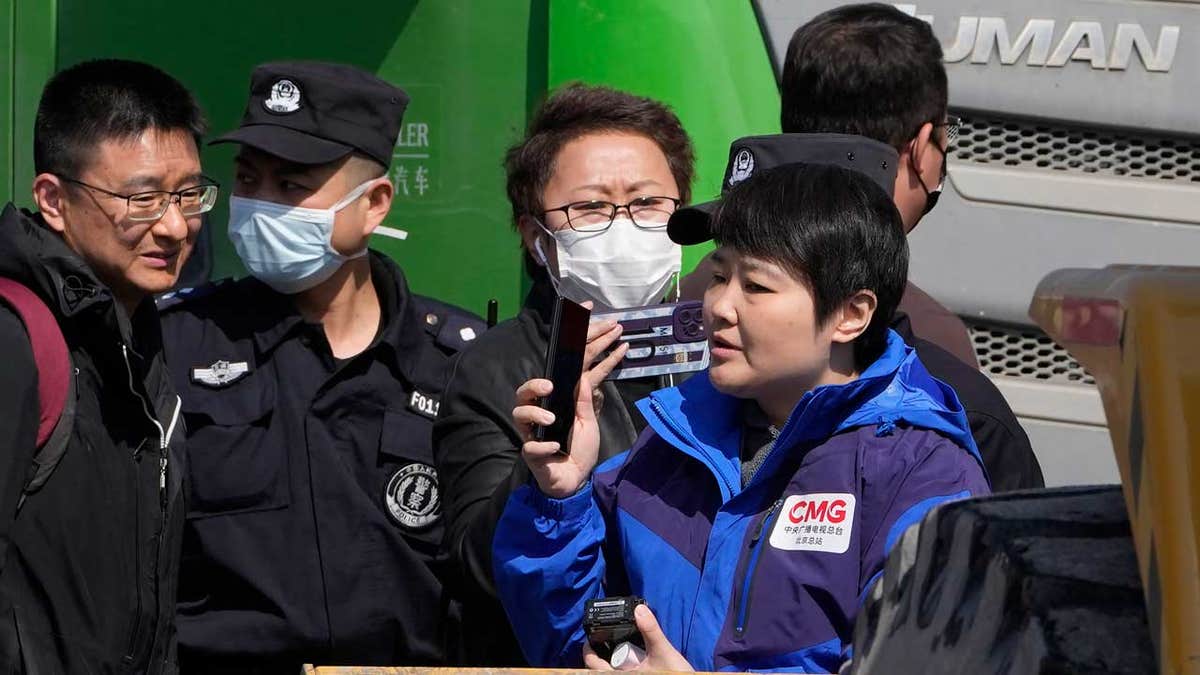close 
Criminals coming from China are ‘absolutely’ linked to the CCP: Joseph Humire
Joseph Humire, of the Center for a Secret Free Society, joined ‘Fox & Friends Weekend’ to discuss reports that Chinese migrant encounters are skyrocketing under Biden.
City officials in eastern China apologized to local journalists after authorities were shown pushing them and trying to obstruct reporting from the site of a deadly explosion, in a rare acknowledgment of state aggression against journalists.
The city of Sanhe, near Beijing, issued a public apology Thursday after authorities were shown harassing reporters from state broadcaster CCTV during a live broadcast near the site of a suspected gas leak explosion that killed seven and injured 27 on Wednesday.
Harassment of journalists — especially foreign reporters — is common in China but almost never acknowledged by the state.
2 DEAD, DOZENS INJURED IN SUSPECTED GAS EXPLOSION OUTSIDE BEIJING
A statement on the city’s official website expressed “deep regret” over the treatment of the CCTV reporters and other media workers. It said authorities were trying to remove the journalists from the site because they were concerned about a potential gas leak.
“The poor communication skills of our frontline staff and their rough and simplistic methods caused misunderstandings among journalists and doubts among the public, resulting in a negative social impact,” it said.

Chinese journalists were pushed by Chinese security personnel as reporters attempted to secure coverage of the explosion in Sanhe city in China’s Hebei province on Wednesday, March 13, 2024. (AP Photo/Ng Han Guan)
The incident, shown live during the midday newscast, was a rare off-script moment for China’s tightly controlled state media. Beijing regards media as propaganda tools and regularly issues directives about topics that are off-limits for coverage.
The All-China Journalists Association put out a statement defending the journalists’ rights to report from disaster sites. It fell short of explicitly condemning the Sanhe authorities’ actions.
China’s harassment of journalists is often directed at foreign reporters. Earlier this month, a Dutch journalist and a camera operator were detained while reporting on a protest outside an investment bank in the southwestern province of Sichuan. Authorities shoved the journalist to the ground and used umbrellas to block the camera.
Foreign journalists are also often followed by plain-clothes police, especially when reporting from areas considered sensitive by the Chinese government, such as the western region of Xinjiang.
Such incidents are regularly condemned by the Foreign Correspondents’ Club of China, a professional group.
But the Chinese Foreign Ministry, which is the point of contact for foreign journalists in the country, has never in recent memory publicly acknowledged or apologized for the harassment.
China is also the country with the most imprisoned journalists — 44 in 2023, according to a report by the Committee to Protect Journalists.
2 CHINESE FISHERMEN DROWN WHILE BEING CHASED BY TAIWAN’S COAST GUARD FOR ALLEGED TRESPASSING
Over the past few years, China has also increasingly restricted journalists’ access to politicians and officials of any kind.
This year, Beijing canceled the annual news conference by the premier – a 30-year tradition that constituted one of the rare times a top Chinese leader took questions from journalists.
